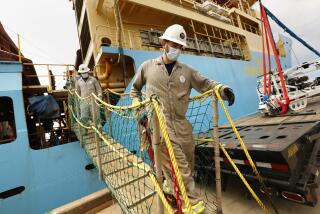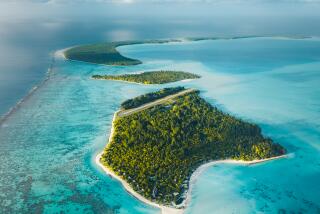At 63, Diver Draws Hope From Sea
- Share via
One of these days Rodolphe Streichenberger will fish himself out of the ocean, take off his wet suit and return home to France for a retirement on land.
Since the beginning of 1988, he and a host of volunteers have been planting kelp in a 10-acre undersea plot about 300 yards off the Balboa Pier in an attempt to lure fish to the saltwater forest.
Streichenberger was shocked recently when vandals destroyed much of the work that had been done there the past four years.
“It was a lost experiment,” moaned the Balboa Island resident. “It was a total loss. Perhaps it was a crazy man who did it.”
But the 63-year-old aquaculturist, as he calls himself, and his volunteers have been back working the water three days a week to replace the damaged kelp that will someday be home to lobster, mussels, abalone, bass and other sea life.
“I went into the water and stayed there by myself and tried to understand what happened,” he said in his thick French accent. “It was a good dive for me. A person sometimes has to reserve time for solitude.”
He is philosophical about the tragedy.
“Sometimes you have successes and sometimes you have failures,” said the one-time research and development director for his family’s fertilizer and building materials business in France.
After the business was sold Streichenberger opened his own research and development company and looked for an enterprise that would grow.
The one-time French paratrooper decided to grow things in water.
“I didn’t find suitable land,” he explained, and settled on growing kelp. “A professor at Caltech invited me to work his lab, and that continued for years on. It was very precise scientific work to see how seawater could produce life.”
He eventually obtained a five-year lease from the state Department of Fish and Game for the 10 acres off Newport Beach and formed the nonprofit Balboa Island-based Marine Forest Society.
“I like to be a pioneer,” said the divorced father of three who contends his underwater experiment is a sound venture that someday may pay dividends to those who plant and then harvest underwater. “To know how seawater can produce life is wonderful knowledge,” he said.
Part of his economic reasoning comes from his studies at K.E.C. University in France where he gained a degree in economics. That school training helped him run the family business in Lyon, France.
Despite his education and family money that gave him a high lifestyle that included mountain climbing, airplane and glider flying and horseback riding, “Right now I’m very poor,” he contends. “The trick to survival is not to spend. I have very little income.”
The lure of the sea and its creatures gave him new goals as well as a healthy body he attributes to exercise from diving.
“I love the sea and I love diving and the solitude that comes with it; I like to be alone, like most creative people.”
More to Read
Sign up for Essential California
The most important California stories and recommendations in your inbox every morning.
You may occasionally receive promotional content from the Los Angeles Times.













